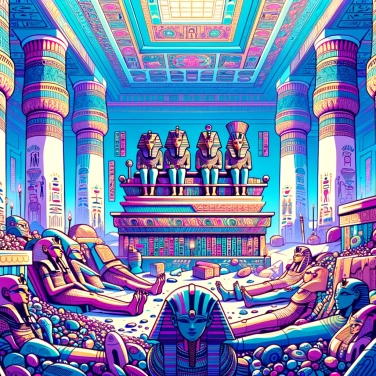The pharaohs were buried with so much wealth because they believed in the afterlife and thought they would need these goods for their journey to the afterlife. These treasures were also meant to ensure their eternal status and prestige.

In ancient Egypt, pharaohs believed that earthly death led to a second life, one that was eternal. But to enjoy the afterlife comfortably, one had to arrive well-equipped. They firmly believed that the soul, called the ba, could leave their body but remained strongly linked to it. As a result, to continue living peacefully in this new world, they were buried with a host of valuable and practical objects: gold jewelry, luxurious furniture, food, drinks, and sometimes even their pets. The idea was that these riches would accompany them on the other side, ensuring a pleasant and easy existence with the gods. There was no question of arriving there empty-handed, or else entry would be refused, or their eternal comfort compromised!
In their time, the pharaohs were not merely seen as great leaders but rather as true representatives of the gods on earth. They were viewed as a living symbol of supreme power, meant to maintain the order and balance of the world. By burying their sovereign with impressive treasures, the Egyptians clearly expressed their respect, the greatness of the deceased pharaoh, and his social superiority. The more the tomb was filled with gold, precious jewels, rare and expensive objects, the more it showed everyone that this pharaoh mattered immensely in this life, and in the afterlife. This splendor served not only to honor their memory but also to proudly display their power and very high status for eternity.
Pharaohs departed for the afterlife accompanied by a true suitcase for eternity. Inside, all sorts of precious objects, such as gold jewelry, richly decorated weapons, and even luxurious furniture, were meant to ensure their comfort after death. The tombs were filled with food offerings, drinks, but also everyday items to help the deceased make their journey to the other world peacefully. Amulets were often placed near the body or around the pharaoh's neck, each having a specific role to protect the deceased from potential dangers during their passage to the afterlife. Certain objects like canopic jars were specifically used to preserve the organs, deemed essential for survival in the land of the dead. These funeral rites and objects were meticulously planned and organized, as for the Egyptians, nothing was left to chance on the road to eternity.
The ancient Egyptians were haunted by the fear of being bothered by demons or hostile creatures after their death. As a result, the tombs were filled with amulets and protective symbols. For example, the Eye of Horus was essential to counter the evil eye or invisible threats. Another favorite was the sacred scarab, known as the Heart Scarab, which ensured the protection of the deceased's heart during the soul judgment trial. The presence of divine statues meant to watch over the occupant was also significant: a kind of personalized VIP security service. Finally, to further secure the afterlife, the pharaohs had special texts, kinds of guides or explanatory notes to face the dangers of this new world with peace — the famous Pyramid Texts or Book of the Dead.
The Egyptians often placed figurines called 'ushabtis' in tombs; their role was to perform the manual labor required by the pharaoh in the afterlife.
The pyramids were not just tombs; they were also seen as symbolic representations of the rays of the sun, allowing the pharaohs to ascend to the heavens to join the gods.
The opening of a pharaonic tomb was often accompanied by curses inscribed on the walls to deter potential looters, some threatening divine intervention.
The solid gold funerary mask of Pharaoh Tutankhamun weighs approximately 11 kilograms and is considered one of the most remarkable masterpieces of ancient Egyptian art.
The tombs of the pharaohs were frequently looted because they contained a vast amount of gold and precious objects. Many thieves were attracted to these treasures, despite the risks involved, such as supposed traps and curses. This explains why few tombs have survived intact to our time.
According to Egyptian beliefs, the precious objects placed in the tomb were intended to accompany the pharaoh in the afterlife, ensuring him comfort, wealth, food, and high social status. Furthermore, some treasures, such as amulets, had a protective function against enemies and evil spirits.
No, only the wealthiest or most important individuals were buried with a significant amount of material goods. Ordinary citizens typically had modest graves with little to no valuable items inside, though they might have had some objects of religious or symbolic significance.
The most famous archaeological discovery is that of the tomb of Tutankhamun, discovered in 1922 by Howard Carter. It is primarily known for its exceptional quantity of preserved treasures, such as its solid gold funerary mask, statues, jewelry, beautifully decorated furniture, and several other precious items.
The hieroglyphs on the walls of the tombs contained religious texts, prayers, and magical formulas intended to facilitate the deceased's journey to the afterlife, to ensure their protection, and to secure their passage to eternal life. They served as a 'travel guide' for the pharaoh's spirit after death.
Sure! Here is the translation: "No, although their main function was funerary, to house the body of the pharaoh and his treasures, the pyramids were also symbols of political power, social stability, and served to affirm the prestige of the sovereign among his people and neighboring civilizations."

0% of respondents passed this quiz completely!
Question 1/5